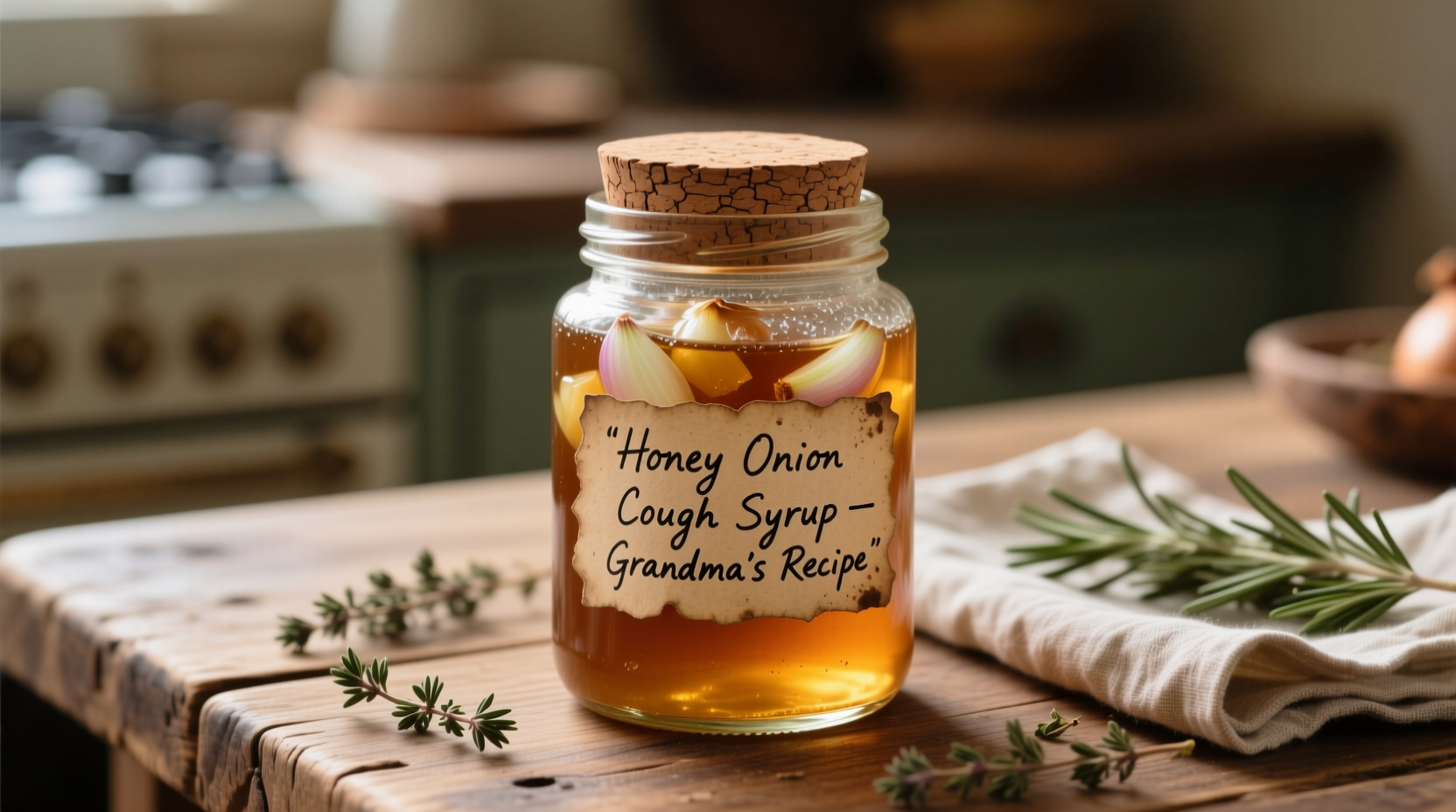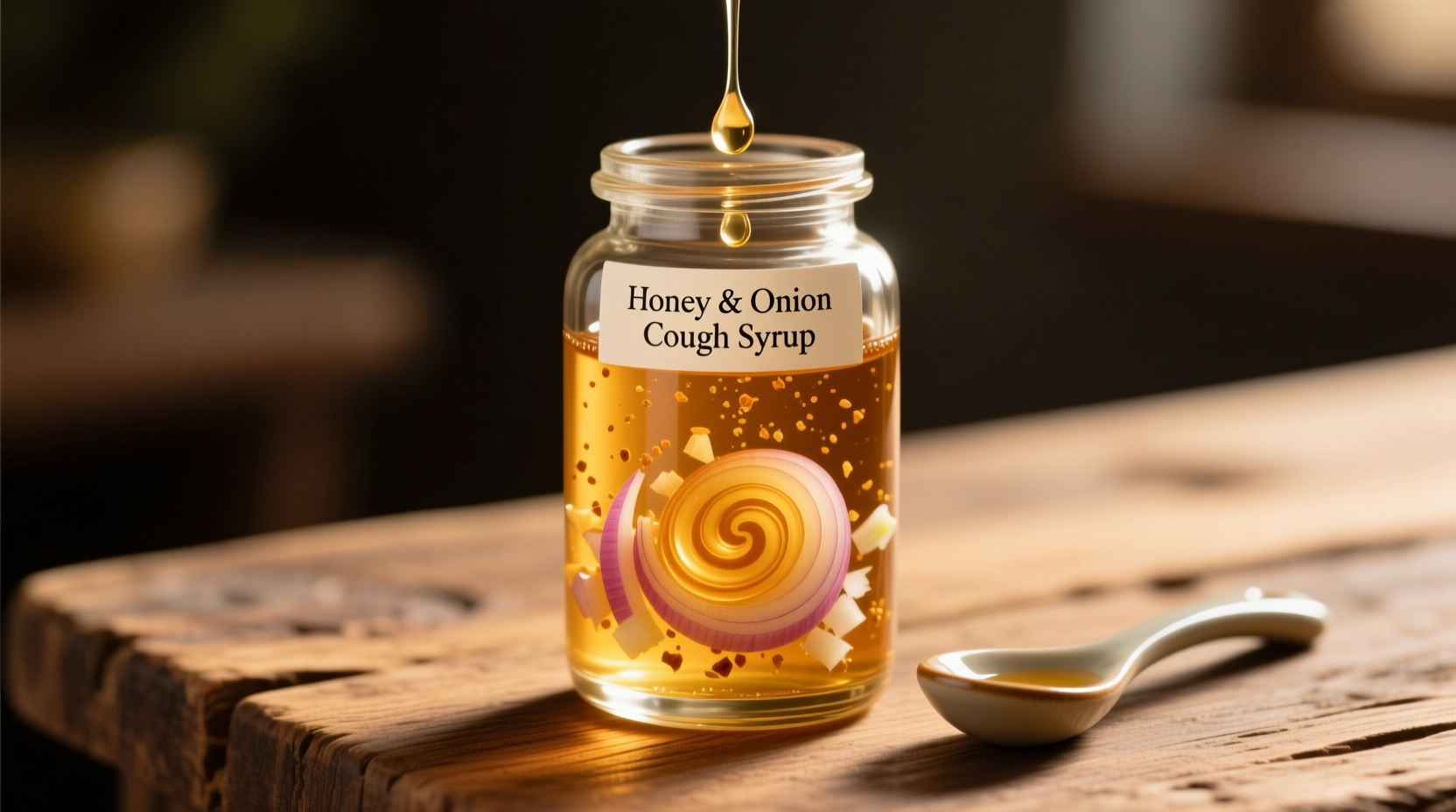Honey and onion cough syrup may provide temporary relief for mild coughs in adults, but lacks strong scientific evidence. The CDC and Mayo Clinic confirm honey's effectiveness for cough suppression, while onion benefits remain largely anecdotal. Never give honey to children under 1 year due to botulism risk. This remedy works best as a short-term comfort measure for minor respiratory irritation, not as treatment for serious infections.
Does Honey and Onion Cough Syrup Actually Work?
When you're battling a persistent cough, the promise of a simple kitchen remedy can be tempting. Many cultures have used honey and onion combinations for centuries as a natural cough suppressant. But what does modern science say about this traditional remedy?
Research shows honey has documented benefits for soothing coughs. A CDC-endorsed study found honey reduced nighttime coughing and improved sleep quality in children over age 1 more effectively than placebo. The thick consistency coats irritated throat tissues, while its natural antioxidants may reduce inflammation.
Onions contain quercetin and other compounds with potential anti-inflammatory properties. However, National Center for Complementary and Integrative Health research shows limited clinical evidence supporting onion's effectiveness for respiratory symptoms. Most benefits come from traditional use rather than rigorous scientific validation.
| Remedy Component | Scientific Support | Recommended Use | Key Limitations |
|---|---|---|---|
| Honey | Strong evidence for cough suppression in adults and children over 1 | 2 teaspoons as needed for cough relief | Never for children under 1 year; not for diabetes management |
| Onion | Limited evidence; primarily traditional use | As flavoring agent in syrup preparation | No proven dosage; potential stomach irritation |
| Honey-Onion Combination | Anecdotal evidence only | Short-term comfort for mild coughs | Not for serious infections; temporary relief only |
How to Prepare Honey and Onion Cough Syrup Safely
Creating an effective and safe honey-onion syrup requires proper technique. Follow these evidence-based preparation guidelines:
Basic Recipe for Adults
- Peel and finely chop 1 medium yellow onion
- Place in glass jar and cover with 1/4 cup raw honey
- Cover and let sit at room temperature for 4-6 hours
- Strain liquid into clean container
- Take 1-2 teaspoons as needed for cough relief
The waiting period allows the honey to extract beneficial compounds from the onion through osmosis. Store prepared syrup in the refrigerator for up to 2 weeks. Always use clean utensils to prevent contamination.

When This Remedy Helps (and When It Doesn't)
Understanding the appropriate context for using honey and onion syrup prevents misuse and potential harm. This remedy works best for:
- Mild, dry coughs from postnasal drip
- Temporary relief during early cold symptoms
- Nighttime coughing that disrupts sleep
- Adults seeking natural comfort measures
Do not rely on this remedy for:
- Coughs lasting more than 10-14 days
- Productive coughs with colored mucus
- Coughs accompanied by fever over 101°F (38.3°C)
- Difficulty breathing or chest pain
- Children under 1 year (honey risk)
The Mayo Clinic emphasizes that while honey can soothe coughs, it doesn't treat underlying infections. If your cough persists beyond two weeks or worsens, consult a healthcare provider to rule out serious conditions like bronchitis or pneumonia.
Better Alternatives for Specific Cough Types
Not all coughs respond to the same treatments. Match your remedy to your specific symptoms:
- Dry, tickly cough: Honey alone (1-2 tsp) provides effective coating
- Productive cough: Stay hydrated with warm liquids; avoid suppressants
- Allergy-related cough: Address underlying allergies with appropriate medication
- Nighttime cough: Elevate head while sleeping in addition to honey
For children over 1 year, the American Academy of Pediatrics recommends honey as the preferred over-the-counter cough treatment. For infants with coughs, always consult a pediatrician before attempting any home remedy.
Safety First: Important Precautions
While generally safe for adults, honey and onion syrup requires these important precautions:
- Never give honey to infants under 1 year - risk of infant botulism
- Diabetics should monitor honey intake due to sugar content
- Stop use if you experience stomach upset or allergic reactions
- Don't use as replacement for prescribed medications
- Discard if mold appears or unusual odor develops
Remember that home remedies like natural cough syrup with honey and onion shouldn't replace professional medical care when needed. The World Health Organization classifies persistent cough as a potential symptom of serious conditions requiring medical evaluation.
Frequently Asked Questions
Can I use honey and onion syrup for my child's cough?
Honey can be used for children over 1 year old, but never for infants under 12 months due to botulism risk. The American Academy of Pediatrics recommends 1/2 to 1 teaspoon of honey for children 1-5 years, 1 teaspoon for 6-11 years, and 2 teaspoons for children 12 and older. Onion syrup alone isn't recommended for children without pediatric consultation.
How long does homemade honey onion cough medicine last?
Properly prepared and stored in a sealed container in the refrigerator, honey onion cough syrup remains effective for 2-3 weeks. Discard immediately if you notice mold, unusual odor, or fermentation bubbles. For best results, make small batches you'll use within a week.
Is raw honey better than regular honey for cough syrup?
Raw honey contains additional enzymes and antioxidants that may enhance its soothing properties. A 2021 study in the Journal of Medicinal Food found raw honey had higher antioxidant activity than processed honey. However, both types provide effective cough relief. The key factor is using pure honey without added sugars.
Can I add lemon or ginger to honey onion cough syrup?
Yes, adding lemon (for vitamin C) or ginger (for anti-inflammatory properties) can enhance the syrup's potential benefits. The University of Maryland Medical Center notes ginger may help reduce throat inflammation. Use 1-2 tablespoons of fresh lemon juice or 1 teaspoon grated ginger per recipe. However, these additions don't replace medical treatment for serious symptoms.
How quickly should I expect relief from honey onion cough remedy?
Most people experience soothing effects within 15-30 minutes of taking the syrup, with peak effects around 2 hours. Relief typically lasts 2-4 hours. If you don't notice improvement after 24 hours of proper use, or if symptoms worsen, consult a healthcare provider as you may need medical treatment.











 浙公网安备
33010002000092号
浙公网安备
33010002000092号 浙B2-20120091-4
浙B2-20120091-4